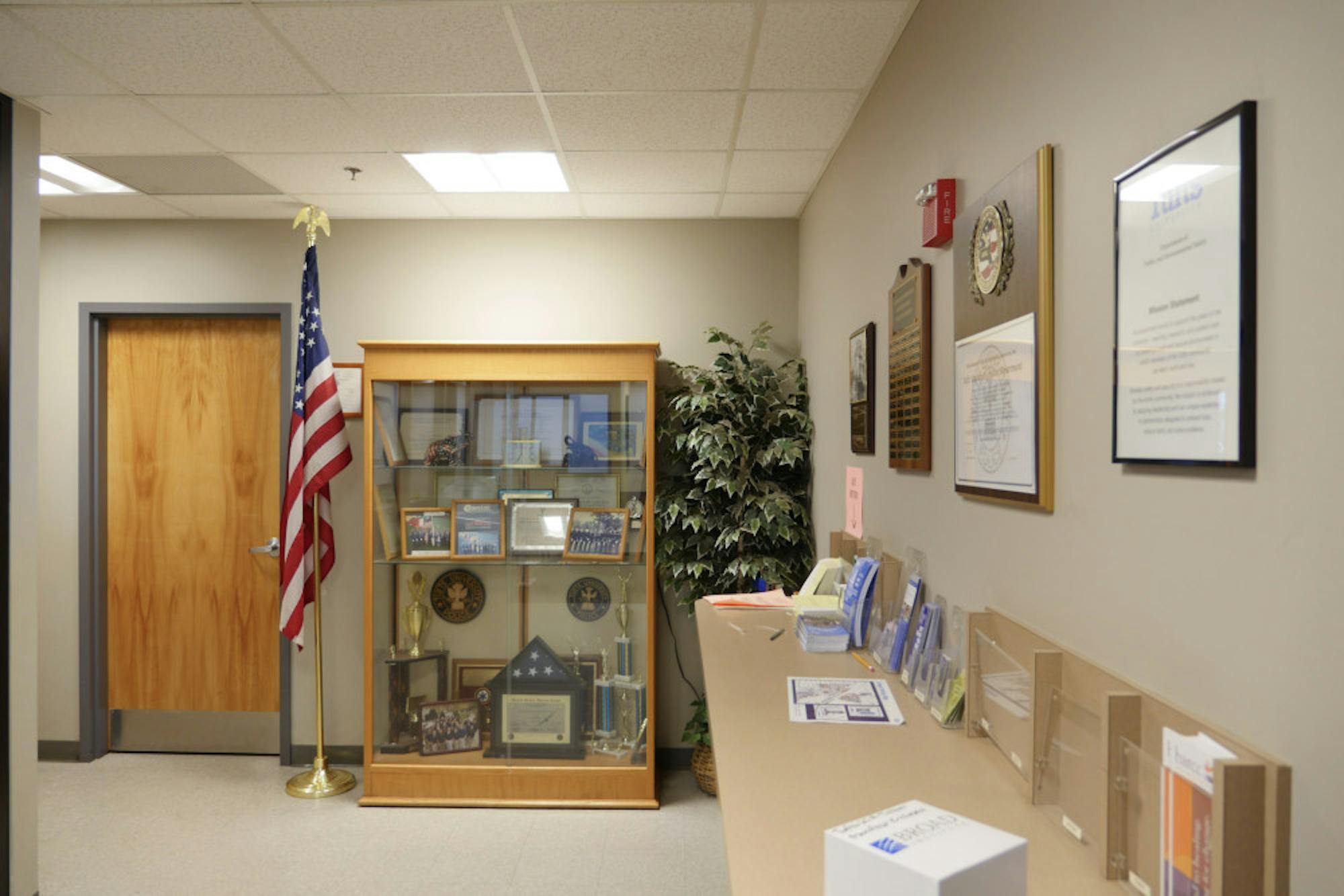The Tufts University Police Department has made reforms related to arming and mental health under the new leadership of Yolanda Smith, the first Black woman to directly oversee TUPD. The reforms, which have been met with mixed reception, stem from suggestions made by the WorkingGroup on Campus Safety and Policing which was assembled as part of the Tufts as an Anti-Racist Institution initiative.
Smith, the executive director of public safety, addressed recent reforms in an email to the Tufts community on April 21. In the email, Smith outlined changes to TUPD policy, including the formation of the Campus Safety Advisory Board, a new mental health response model and improved training programs for TUPD officers.
Citing the Working Group on TUPD Arming’s suggestion of a “hybrid model” of policing, Smith also announced that an unarmed“campus security officer” would address nonviolent situations on the Medford/Somerville campus beginning in fall 2022. In an email to the Daily, Smith said that “the primary focus of the new model will be de-escalation [and] diversion from arrests.”
Students from Tufts’ Student Prison Education and Activism Coalition, a group that has been critical of TUPD policies in the past and believes that TUPD should be abolished, expected different changes to come from the working group on arming’s findings. Laura Kelly, a member of SPEAC, found Smith’s latest email to be “misleading.”
“While [TUPD does] say that [it is] working to disarm, it just means adding more unarmed officers,” Kelly, a sophomore, said. “That’d be a bigger police presence on campus, which is not a win in our eyes.”
Grace Borbon, who is also a member of SPEAC, agreed with Kelly.
“We took [the hybrid model] to mean that they were going to disarm or retrain a part of their current armed force …whereas they’re keeping all of their armed officers, and supplementing that with an entire new force of [unarmed] officers,”Borbon, a first-year, said.
Amma Agyei, the outgoing president of the TCU Senate, was pleased that TUPD will change its current response model.
“I felt like it was unnecessary to have armed police officers showing up for non-emergency reasons,” Agyei said. “We need mental health professionals instead of … armed police officer[s] which could escalate the situation.”
During her TCU Senate campaign, Agyei’s platform supported a hybrid police response rather than complete disarmament of TUPD.
“Past [TCU Senate] presidents … have been fighting for the complete disarmament of TUPD,”Agyei said. “I felt like coming to a middle ground and then moving on from there was a better approach.”
According to Smith, the new hybrid model will decrease the presence of municipal police on campus, while handling mental health calls holistically to de-escalate crisis situations.
Following the completion of the Campus Safety and Policing Workstream’sfinal report in February 2021, TUPD announced that it would create a new mental health working group in collaboration with Counseling and Mental Health Services.
“TUPD is currently working out details to embrace a Crisis Intervention Team program that will give officers more tools to do their jobs safely and effectively,” Smith wrote.
While Borbon disagreed with TUPD’s plans to address mental health crises, she said this is a step in the right direction.
“It is important that [TUPD is] recognizing at least that … nearly all students don’t want an armed response for building checks or for mental health crises.”
Smith encouraged the community to view the public safety dashboard, which follows the status of various TUPD initiatives in response to the working group’s report. The dashboard is part of a larger effort from TUPD to increase transparency and collaboration.
“[TUPD is] also looking to onboard a Communications Manager who will help with the website and internal communications between TUPD and the community,” Smith wrote.
Agyei believes that, in the future, TUPD officers should appear more approachable.
“[TUPD officers’] mission is to keep us safe, is to be there for us,”Agyei said. “The whole uniform, guns, sitting in the car … it almost seems like [they’re] just waiting to get someone else in trouble … [they] should be here to help us and not intimidate us.”
Borbon said that these changes — although not perfect — mark action from the administration that has been lacking in the past.
“There [have] been attempts to make meaningful change on the part of the student body, and the administration just has not responded to that,” Borbon said. “This would probably be their most concrete step towards any type of change, even if it’s not necessarily the change that we want.”
Agyei, who had never been inside TUPD’s office prior to meeting Smith, said the new executive director of public safety was very approachable and open to conversation.
“[Smith] made herself super available to me,” Agyei said. “She was willing to listen to my ideas. … [Smith was] definitely more available than past chiefs of police.”
Kelly hopes that Smith will be receptive to students’ concerns and suggestions in the future.
“I’m hoping that as we continue to push and to promote different strategies of campus safety that she will be attentive and listen to students,” Kelly said.






